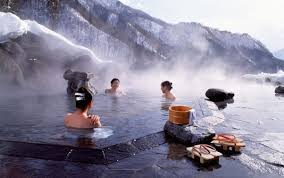Onsen refers to natural hot springs in Japan, renowned for their therapeutic benefits and cultural significance. These geothermal springs are heated by volcanic activity and are found throughout Japan, offering a relaxing and often communal bathing experience. Here’s a detailed look at onsen culture and what to expect:
Types of Onsen
Public Onsen (Sento):
- Description: Public bathhouses that feature onsen water. They are usually more accessible and may offer both indoor and outdoor baths.
- Features: Often have multiple pools with varying temperatures, and may include additional amenities like saunas or steam rooms.
Ryokan Onsen:
- Description: Traditional Japanese inns (ryokan) that have their own onsen baths. Staying at a ryokan provides a full onsen experience, often including meals and traditional Japanese accommodation.
- Features: Private or semi-private onsen baths are often available for guests, sometimes with views of beautiful gardens or natural landscapes.
Day-Use Onsen:
- Description: Onsen facilities that allow visitors to use the baths for a few hours or a day, without staying overnight. These are popular for a relaxing day trip.
- Features: May include communal baths, private rooms with baths, and relaxation areas.
Private Onsen (Kashikiri Onsen):
- Description: Private onsen baths that can be reserved for individual use, offering a more intimate and personal experience.
- Features: Ideal for couples or families, providing privacy and often luxurious settings.
Onsen Etiquette
Pre-Bath Cleaning:
- Rinsing: Before entering the onsen bath, thoroughly wash and rinse your body at the provided washing stations. This is typically done seated on small stools using hand-held showers, soap, and a washcloth.
- No Splashing: Keep noise and splashing to a minimum to maintain a peaceful environment.
Swimwear and Towels:
- Nudity: Onsen bathing is done nude. Swimwear is not allowed in communal onsen baths.
- Small Towel: You may bring a small towel to the bath area, but it should not be brought into the water. Use it for drying off before and after the bath, and keep it on the side of the bath.
Hair and Hygiene:
- Hair: Long hair should be tied up or kept out of the water. This is to maintain the cleanliness of the onsen water.
- No Soaps: Do not bring soap or shampoo into the onsen bath. Clean yourself thoroughly before entering.
Tattoo Policy:
- Tattoos: Tattoos can be culturally sensitive in Japan, and some onsen may have restrictions or bans on tattooed individuals. However, attitudes are changing, and some onsen now welcome tattooed guests or offer private baths.
Benefits of Onsen
Therapeutic Properties:
- Mineral Content: Onsen water is rich in minerals like sulfur, sodium chloride, and calcium, which can help with skin conditions, improve circulation, and alleviate muscle pain.
- Relaxation: Soaking in hot water promotes relaxation, reduces stress, and can improve sleep quality.
Health Benefits:
- Muscle Relief: The warmth of the onsen helps soothe aching muscles and joints, making it beneficial for those with arthritis or other physical ailments.
- Detoxification: The minerals in onsen water can help detoxify the body and improve overall well-being.
Popular Onsen Destinations
Hakone:
- Location: Kanagawa Prefecture, close to Tokyo.
- Features: Known for its numerous onsen resorts and scenic views of Mount Fuji.
Beppu:
- Location: Oita Prefecture, Kyushu.
- Features: Famous for its variety of hot spring baths and unique "Hells" (Jigoku) tours showcasing different types of hot spring features.
Kusatsu:
- Location: Gunma Prefecture.
- Features: Renowned for its high-quality sulfuric waters and traditional ryokan accommodations.
Kurokawa Onsen:
- Location: Kumamoto Prefecture, Kyushu.
- Features: A picturesque onsen town known for its traditional charm and outdoor baths along the river.
Yufuin:
- Location: Oita Prefecture, Kyushu.
- Features: Offers a blend of onsen and charming countryside views, with a focus on relaxation and wellness.
Onsen Etiquette and Cultural Significance
Onsen bathing is not just about physical relaxation; it also plays a significant role in Japanese culture and social life. It’s an opportunity for people to unwind, socialize, and enjoy the natural beauty surrounding the hot springs. Whether visiting a public bathhouse, staying at a traditional ryokan, or enjoying a private onsen, adhering to proper etiquette and appreciating the cultural aspects will enhance your onsen experience.


No comments:
Post a Comment